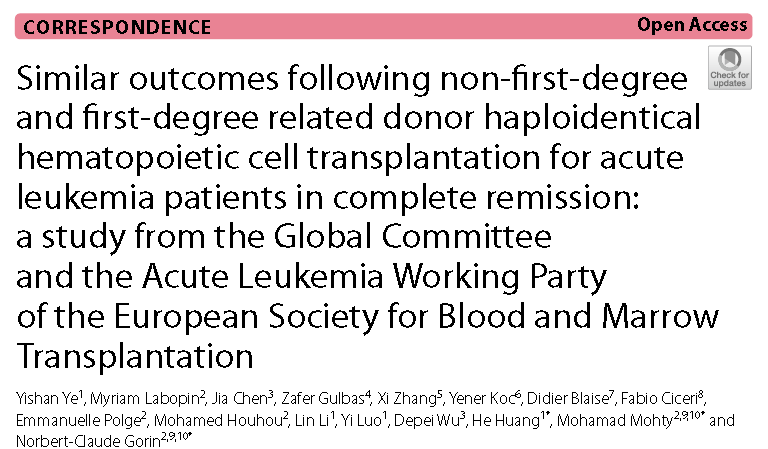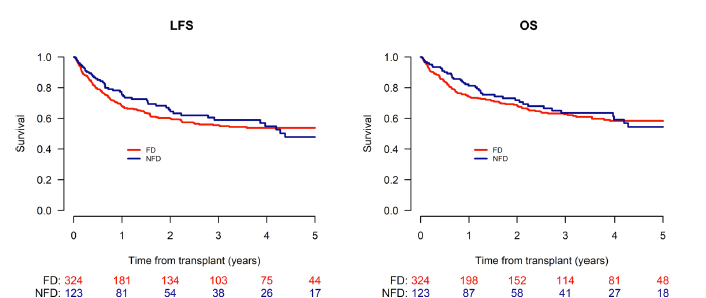Allogeneic haematopoietic cell transplantation (allo-HCT) is a key treatment for a variety of benign and malignant haematological disorders. Its proportion in allogeneic transplantation has been increasing in recent years due to advances in haploidentical haematopoietic stem cell transplantation (haplo-HCT). However, although haplo-HCT has greatly expanded the donor pool for allo-HCT, some patients are still unable to find a suitable haploidentical donor in their immediate family or among their siblings (first-degree related donor, FD donor). For any patient, a haploidentical donor could often be found among non-first-degree relatives (NFD donors) (e.g. cousins, siblings, uncles, aunts, etc.). The safety and efficacy of using such donors for haplo-HCT is not entirely clear. A multicentre study conducted by the Zhejiang HCT Collaborative Group, led by The Bone Marrow Transplantation Centre of The First Affiliated Hospital, Zhejiang University School of Medicine (FAHZU) and published in the journal Bone Marrow Transplantation, has confirmed the safety and efficacy of haplo-HCT using this type of donor.

On March 18, 2023, the global multicenter study on similar outcomes following non-first-degree and first-degree related donor haploidentical hematopoietic cell transplantation for acute leukemia patients in complete remission, co-led by Professors HUANG He and Gorin, and published by Professor HUANG's team in collaboration with the European Society for Blood and Marrow Transplantation, was published in the Journal of Hematology & Oncology. Professor HUANG He, President of the First Affiliated Hospital, Zhejiang University School of Medicine, Professor Gorin, Member of the French Academy of Medical Sciences, and Professor Mohamad Mohty, Head of the EBMT Acute Leukemia Working Party, are the co-corresponding authors of the paper, and the first author is Dr. YE Yishan, an attending physician at the Bone Marrow Transplantation Centre, the First Affiliated Hospital, Zhejiang University School of Medicine.
To further compare the efficacy of haplo-HCT in non-first-degree related donors versus first-degree related donors, Professor Huang He and Professor Gorin's teams initiated this international multicenter study. The preliminary data were presented in a poster session at ASH 2022 and have attracted widespread interest from colleagues in the field. The study included 2703 adult acute leukemia patients in CR status from 177 centers worldwide who received their first haplo-HCT between 2010 and 2021. One hundred and twenty-three NFD donor and 324 FD donor haplo-HCT cohorts were matched and analyzed using exact matching and propensity scores. Both cohorts achieved good engraftment rates. Two-year relapse and non-relapse mortality rates were not significantly different. Two-year overall survival (OS), leukemia-free survival (LFS), and graft-versus-host disease-free relapse-free survival (GRFS) were also not significantly different. There was also no significant difference in the incidence of acute and chronic graft-versus-host disease (GVHD) between the two cohorts.

Fig. Transplant outcomes comparing the NFD or FD related HAPLOs.
The study confirms that NFD donors achieve similar transplant outcomes as FD donors in haploidentical transplantation and can be an equivalent alternative to FD donors. This study is expected to change the guidelines for donor selection for haematopoietic stem cell transplantation and is a solid step towards achieving the goal of "Everyone has a donor".
This study also marks a significant progress between the HUANG He team and the EBMT, which is one of the biggest and most influential international organizations in the field of blood and marrow transplantation. Extensive and in-depth cooperation is expected in the future in the field of hematopoietic cell transplantation and cellular therapy.


